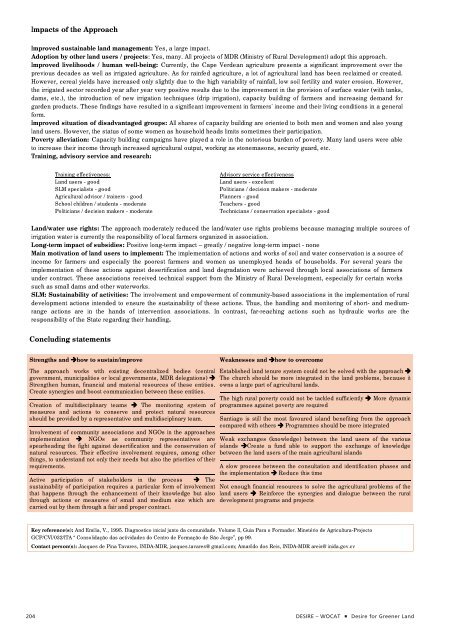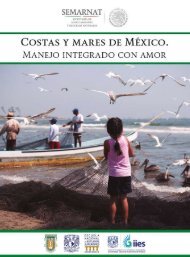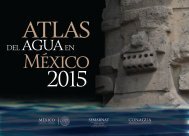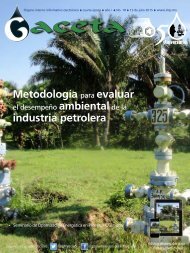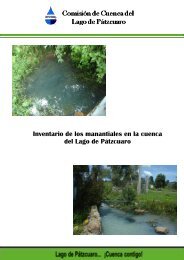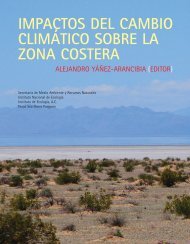Desire for Greener Land
Desire for Greener Land
Desire for Greener Land
You also want an ePaper? Increase the reach of your titles
YUMPU automatically turns print PDFs into web optimized ePapers that Google loves.
Impacts of the Approach<br />
Improved sustainable land management: Yes, a large impact.<br />
Adoption by other land users / projects: Yes, many. All projects of MDR (Ministry of Rural Development) adopt this approach.<br />
Improved livelihoods / human well-being: Currently, the Cape Verdean agriculture presents a significant improvement over the<br />
previous decades as well as irrigated agriculture. As <strong>for</strong> rainfed agriculture, a lot of agricultural land has been reclaimed or created.<br />
However, cereal yields have increased only slightly due to the high variability of rainfall, low soil fertility and water erosion. However,<br />
the irrigated sector recorded year after year very positive results due to the improvement in the provision of surface water (with tanks,<br />
dams, etc.), the introduction of new irrigation techniques (drip irrigation), capacity building of farmers and increasing demand <strong>for</strong><br />
garden products. These findings have resulted in a significant improvement in farmers' income and their living conditions in a general<br />
<strong>for</strong>m.<br />
Improved situation of disadvantaged groups: All shares of capacity building are oriented to both men and women and also young<br />
land users. However, the status of some women as household heads limits sometimes their participation.<br />
Poverty alleviation: Capacity building campaigns have played a role in the notorious burden of poverty. Many land users were able<br />
to increase their income through increased agricultural output, working as stonemasons, security guard, etc.<br />
Training, advisory service and research:<br />
Training effectiveness:<br />
<strong>Land</strong> users - good<br />
SLM specialists - good<br />
Agricultural advisor / trainers - good<br />
School children / students - moderate<br />
Politicians / decision makers - moderate<br />
Advisory service effectiveness<br />
<strong>Land</strong> users - excellent<br />
Politicians / decision makers - moderate<br />
Planners - good<br />
Teachers - good<br />
Technicians / conservation specialists - good<br />
<strong>Land</strong>/water use rights: The approach moderately reduced the land/water use rights problems because managing multiple sources of<br />
irrigation water is currently the responsibility of local farmers organized in association.<br />
Long-term impact of subsidies: Positive long-term impact – greatly / negative long-term impact - none<br />
Main motivation of land users to implement: The implementation of actions and works of soil and water conservation is a source of<br />
income <strong>for</strong> farmers and especially the poorest farmers and women as unemployed heads of households. For several years the<br />
implementation of these actions against desertification and land degradation were achieved through local associations of farmers<br />
under contract. These associations received technical support from the Ministry of Rural Development, especially <strong>for</strong> certain works<br />
such as small dams and other waterworks.<br />
SLM: Sustainability of activities: The involvement and empowerment of community-based associations in the implementation of rural<br />
development actions intended to ensure the sustainability of these actions. Thus, the handling and monitoring of short- and mediumrange<br />
actions are in the hands of intervention associations. In contrast, far-reaching actions such as hydraulic works are the<br />
responsibility of the State regarding their handling.<br />
Concluding statements<br />
Strengths and how to sustain/improve Weaknesses and how to overcome<br />
The approach works with existing decentralized bodies (central<br />
government, municipalities or local governments, MDR delegations) <br />
Strengthen human, financial and material resources of these entities.<br />
Create synergies and boost communication between these entities.<br />
Creation of multidisciplinary teams The monitoring system of<br />
measures and actions to conserve and protect natural resources<br />
should be provided by a representative and multidisciplinary team.<br />
Involvement of community associations and NGOs in the approaches<br />
implementation NGOs as community representatives are<br />
spearheading the fight against desertification and the conservation of<br />
natural resources. Their effective involvement requires, among other<br />
things, to understand not only their needs but also the priorities of their<br />
requirements.<br />
Active participation of stakeholders in the process The<br />
sustainability of participation requires a particular <strong>for</strong>m of involvement<br />
that happens through the enhancement of their knowledge but also<br />
through actions or measures of small and medium size which are<br />
carried out by them through a fair and proper contract.<br />
Established land tenure system could not be solved with the approach <br />
The church should be more integrated in the land problems, because it<br />
owns a large part of agricultural lands.<br />
The high rural poverty could not be tackled sufficiently More dynamic<br />
programmes against poverty are required<br />
Santiago is still the most favoured island benefiting from the approach<br />
compared with others Programmes should be more integrated<br />
Weak exchanges (knowledge) between the land users of the various<br />
islands Create a fund able to support the exchange of knowledge<br />
between the land users of the main agricultural islands<br />
A slow process between the consultation and identification phases and<br />
the implementation Reduce this time<br />
Not enough financial resources to solve the agricultural problems of the<br />
land users Rein<strong>for</strong>ce the synergies and dialogue between the rural<br />
development programs and projects<br />
Key reference(s): And Emilia, V., 1995. Diagnostico inicial junto da comunidade. Volume II, Guia Para o Formador. Minstério de Agricultura-Projecto<br />
GCP/CVI/032/ITA “ Consolidação das actividades do Centro de Formação de São Jorge”, pp 99.<br />
Contact person(s): Jacques de Pina Tavares, INIDA-MDR, jacques.tavares@gmail.com; Amarildo dos Reis, INIDA-MDR areis@inida.gov.cv<br />
204 DESIRE – WOCAT <strong>Desire</strong> <strong>for</strong> <strong>Greener</strong> <strong>Land</strong>


